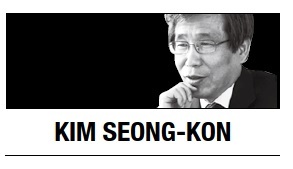[Kim Seong-kon] Standing by the vestiges of the Berlin Wall
By 김케빈도현Published : Nov. 1, 2016 - 14:30
 Germany is known as a country of cutting-edge technology, remarkable preciseness and well-established law and order. To me, however, Germany has always been a land of great writers and masterpieces, such as Goethe’s “Faust” or Schiller’s “The Robbers.” In college, I was fascinated by the soul-searching poems of Rilke, and the bittersweet agonies of Hesse’s protagonists such as Knulp, Goldmund or Siddhartha. I was also enchanted by the absurd predicaments of the modern man Kafka depicted in “Metamorphosis” or “The Trial.” My tender heart was touched by Stefan Zweig’s “Letter from an Unknown Woman.” Bildungsroman novels such as “Demian,” “Tonio Kroger” or “Wilhelm Meister’s Apprenticeship,” too, greatly inspired and shaped my yet unmolded, vulnerable mind.
Germany is known as a country of cutting-edge technology, remarkable preciseness and well-established law and order. To me, however, Germany has always been a land of great writers and masterpieces, such as Goethe’s “Faust” or Schiller’s “The Robbers.” In college, I was fascinated by the soul-searching poems of Rilke, and the bittersweet agonies of Hesse’s protagonists such as Knulp, Goldmund or Siddhartha. I was also enchanted by the absurd predicaments of the modern man Kafka depicted in “Metamorphosis” or “The Trial.” My tender heart was touched by Stefan Zweig’s “Letter from an Unknown Woman.” Bildungsroman novels such as “Demian,” “Tonio Kroger” or “Wilhelm Meister’s Apprenticeship,” too, greatly inspired and shaped my yet unmolded, vulnerable mind. Last week, I flew to Frankfurt to attend the Frankfurt International Book Fair where LTI Korea opened an exhibit booth and sponsored a literary event with the prominent Korean novelist Song Sokze. My two able staff members, Agnel Joseph and Yoonie Lee, were busy having a series of meetings with international publishers to promote Korean literature overseas. At the Book Fair, I ran across a German writer who humorously told me, “I hear Korean ginseng tea is good for your stamina. So I drank it every day, but nothing happened.” I replied to him, jokingly, “I, too, hear the famous German beer, sausage and Ajona toothpaste are good for your health. So I tried them every day, but nothing happened to me either.”
I liked Frankfurt because it was the city where Goethe was born and raised. It was also the city of Adorno, Benjamin and Horkheimer who founded the famous Frankfurt School. I also liked Frankfurt because even though it was a commercial city with skyscrapers, I still could find symbols of German culture here and there, including the Goethe House and traditional architecture in the Romer Plaza.
Bidding farewell to Frankfurt, we went to Berlin for another literary event. At the Berlin train station, we were greeted by Dr. Kwon Sehoon, Director of the Korean Cultural Center. Dr. Kwon informed me that in Germany the unemployment rate is very low, only 5 percent. He told me that Germany had the capacity of adroitly turning a seemingly disastrous situation into an opportunity, as was the case with the recent massive influx of the refugees from the Middle East. For example, the Merkel administration hired five thousand German language teachers for the refugees and began building huge apartment complexes for them, which created abundant jobs for construction workers, carpenters and painters.
Thanks to the warm hospitality and thoughtfulness of Dr. Kwon and his two dedicated staff, we were able to visit the Berlin Wall, or what was left of it, now called the Eastside Gallery because of the drawings and graffiti. The broken Wall reminded me of John le Carre’s novel, “The Spy Who Came in from the Cold,” which delineated the tragic division of Germany during the Cold War era. Looking at the remnants of the Wall, I was overwhelmed and could not help brooding on the Korean Peninsula that is divided by a long barbed wire fence. Wall implies blocking. Thus you need to demolish it when unification happens. On the other hand, barbed wire fence symbolizes intertwined, entangled situations that can hurt people when they try to cross over.
Near my hotel was Checkpoint Charlie, the once best-known crossing point between East Germany and West Germany. Two men in US military police uniform were holding the American flag to attract tourists who took photos incessantly. Ironically, the once bleak and intimidating place is now surrounded by huge KFC and McDonald’s stores. Standing there, looking at Checkpoint Charlie, I pondered on the future of Korea and silently asked myself, “Would it be possible for unification to come to the Korean Peninsula as well? Could Panmunjeom too become a tourist attraction someday?”
Standing at Checkpoint Charlie, I was besieged by the heartbreaking photos of those who were shot while attempting to climb over the Berlin Wall, seeking freedom or reunion with their separated family. Today’s Korea resembles Germany before the fall of the Berlin Wall. In Korea, we still have numerous separated families and those who pine for the hometown they left behind during the Korean War. It occurred to me that we Koreans should learn from Germany how to prepare for and cope with unification.
While I was brooding over the future of Korea, standing by the Berlin Wall, my smartphone alerted me with the news that Korea was boiling over because of the Choi Soon-sil scandal. Suddenly, I recollected the BBC morning news that the recent bad luck of Samsung, Hyundai, Daewoo and Hanjin came as a stunning blow to the economy of South Korea. I silently lamented, “My God! What’s happening to my country?
Heavy-hearted, I boarded the plane bound for Seoul later that day. Leaving Germany, I left my heart at the Berlin Wall.
By Kim Seong-kon
Kim Seong-kon is a professor emeritus of English at Seoul National University and president of the Literature Translation Institute of Korea. He can be reached at sukim@snu.ac.kr. -- Ed.







![[Hello India] Hyundai Motor vows to boost 'clean mobility' in India](http://res.heraldm.com/phpwas/restmb_idxmake.php?idx=644&simg=/content/image/2024/04/25/20240425050672_0.jpg&u=)










